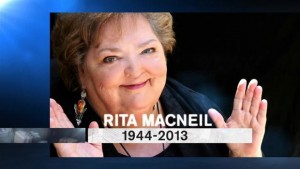rita macneil
I am never ready to write these In Memoriam posts, but the sudden death of Nova Scotian musical icon Rita MacNeil has blindsided me with such force and shock that I have yet to settle into the reality that she is gone. Perhaps coupled with the tragic world events this week my heart isn’t able to process any more pain. Perhaps after losing Raylene Rankin, Stompin’ Tom Connors and Jay Smith in such short succession recently, the idea of losing Rita as well seems especially unfathomable. All I know is that I feel weary under my heavy heart as I relinquish another one of my childhood heroes up to St. Peter’s Cape Breton-style kitchen party.
Before I remember going to the theatre, before I asked my mom if we could get the music of Bette Midler, The Beach Boys or The Rankin Family, EVEN before I fell in love with Waylon Jennings and his song “Amanda”- Rita McNeil’s 1987 Flying On Your Own was the soundtrack I remember in our car. Before I was born my mother had accumulated an eclectic mixture of records, but as a single parent of an often dramatic child she was slow to transition her Boney M, Janis Joplin, Carole King, Carly Simon and other 1970s music icons to cassette. We listened to the radio a lot, but for this reason, for (what seemed like) a long time as a very young child the Rita MacNeil, the Reba McEntire and the Waylon Jennings tapes were the only ones playing on a steady loop as my mother and I drove around Nova Scotia, both of us usually singing along.
Circa 1988, when I was about four years old, my aunt, who was then the Deputy Director of the Atlantic Region Management Training Centre at the Technical University of Nova Scotia, and one of my biggest heroes, got Rita MacNeil as the keynote speaker of her Women in Business Conference entitled, aptly, Flying On Your Own. I remember this being a gigantic moment in our family’s lives. Rita MacNeil was coming into OUR little realm as a feminist hero. I come from a family of feminists. My grandmother, discouraged that she was not allowed to go to school to become a nurse because her mother needed her at home, moved from Souris, Prince Edward Island to Montreal at sixteen (in 1934) in search of independence and adventure with only her younger sister for company. She would become matriarch of the three Campbell girls and work full time outside the home (and inside the home) until I was born in 1984. My Aunt Carol worked her way up in business, going to school at night and continually proving to me that women could be “the boss,” just like Angela Bower (Judith Light) was on Who’s The Boss. My Aunt Joan lived in Toronto and was a police officer there, which, especially in the 1970s and 80s, was the very definition of “kickass.” My mom was a single parent with a full time job as a Health Educator who had been a gym teacher and athlete. She would go on to get her Master’s Degree, while working full time, and graduate with top honours in 2003. In hindsight Rita’s lyrics “You were never more strong, girl/ You were never more alone/ Once there was two/ Now there’s just you/ You’re flying on your own” were glaringly fitting for my mom. Yet, as a child it was the chorus that always resonated so ardently with me: “First you stumble/ Then you fall/ You reach out/ And you fly/ There isn’t anything that you can’t do.” I vaguely remember making up actions to this while sitting in the backseat of our Toyota Corolla. Even at four years old I knew that was the lesson: you are a girl and there isn’t ANYTHING that you can’t do. I remember understanding that Rita was coming to Aunt Carol’s conference to spread this message to all these women, who, like my aunt, were bosses or wanted to be bosses, like Angela Bower, and she was empowering them with the story of her own success. I knew that this was important work. I knew that I wanted to grow up and to be a woman able to do ANYTHING too.
I was too young to attend the conference but my aunt still speaks so highly (and often) of Rita’s grace, kindness and humility during that time. She autographed a record for my grandfather, who was a big fan, which he cherished. This experience made Rita MacNeil tangible to me. I understood that we lived in the same province and that she had a life beyond the radio and the cassette tape and the TV set. She reminded me of an elementary school teacher, the ones who were soft spoken and kind but never talked down to kids, and this radiated in her singing voice as well. There was wisdom in her words, but it was the quiet kind. There is also a striking vulnerability to her music that makes it feel very intimate, even when you are listening to a recording. Even as a child “She’s Called Nova Scotia” would make me cry with a sort of wistful pride that would eventually turn to homesickness.
Nova Scotia is a small province and I think often people who grow up away from giant urban centers feel marginalized, or as though they need to leave their hometown in order to find success or that nothing of international significance could possibly happen in their small sphere of the world. I never felt this way about growing up in Halifax. In fact, I thought that being from Cape Breton actually improved your chances of becoming an international music star (doesn’t it!?). Rita MacNeil paved the way for the exciting and incredible plethora of musicians who continue to pour off the Island and head for platinum record star power. She paved the way for singer/songwriters like Rose Cousins, who won a Roots & Traditional Solo Record of the Year tonight at the Junos. Rita wrote about Cape Breton, she wrote about Nova Scotia and the people and the stories of our history and our ancestors. She inspired people like Jimmy Rankin who would do (and still does) the same and between Rita MacNeil and The Rankin Family Nova Scotian culture was transported all over the world and continues to reverberate there. How could I think as a child that the place I came from was insignificant or liable to hold me back when there were more songs sung in my childhood about my home than about Toronto or New York or anywhere else? Not only was I encouraged to be a strong woman, a smart woman, a determined woman who could do anything, I was being encouraged to be a proud Nova Scotian woman who loved my province and my heritage. Not a bad role model for a four year old!
I was a child who paid close attention to the lyrics of songs and I liked when I understood the story that the singer was imparting to me. I often misheard lyrics (or re-interpreted them so they made sense to me) so I appreciated Rita’s crisp diction and the simple imagery she was able to evoke about big ideas and poignant, deep concepts, even to a young child. Her 1993 Christmas album Once Upon a Christmas conjures up so many memories for me of listening intently to her lyrics amid bustling through my favourite time of year, cozy and joyful with my family. It reminds me of Christmas concerts in the Sacred Heart gym, decorating Christmas trees at Aunt Carol’s house, coloring paper reindeer, bringing Quality Street chocolates for my classmates and having sing-alongs in the Little Theatre. It reminds me of trying to understand what the story of “Good King Wenceslas” meant (Hither Page? Yonder peasant? Bear them thither? WHAT DOES THAT MEAN!?) of learning “Oh Come, All Ye Faithful” in Latin (my phonetic Latin is still far better than my phonetic Gaelic) and it reminds me of considering the lyrics of “Rocking the Cradle” and, for the first time, thinking of Mary and Jesus as being real people just like me and my mom- a revolutionary idea to me at the time and one that would help shape my ideas about religion and the world. Around this time Rita also hosted a television program that I remember watching haphazardly; I always liked when she had the Rankins as guests, and she also had a Christmas special and sometimes she would do duets with Anne Murray and it was impossible to forget that I lived in the same province where all the famous singers came from.
As I grew older, of course, cassettes shifted to compact discs and I ventured into different styles of music from places far away from me. Yet, in October 2002, at seventeen, I found myself at the Opening Night of Charlie Rhindress’ play Flying On Her Own at Neptune Theatre. It was directed by Margaret Bard and starred Denise Oucharek, Raquel Duffy, Nicola Lipman and Frank MacLean. I ended up writing an essay/review of the production for my Theatre 1800 class at Dalhousie. Here is a fun excerpt, “This moving play about a truly inspirational Maritime talent is filled with beautiful acting moments and wonderful music that soars through the theatre and touches the heart. [Raquel] Duffy and [Denise] Oucharek are a delightful match for one another and perfectly suited to play MacNeil. It is clear that they too are “flying on their own” ways to success and greatness.” Somehow after the show had ended I managed to introduce myself to Denise Oucharek, who is even more of a delight offstage than she is onstage, and we forged an immediate connection and friendship that still persists to this day. After hearing that I had been a fan of Rita’s since I was three or four years old Denise immediately shocked and astonished the daylights out of me when she said, entirely nonchalant, “Come meet her, then!” COME MEET HER THEN!? And so, before I knew what was happening, there I was, seventeen years old and towering over a very real and beaming Rita MacNeil. I’m fairly sure the words I said to her were unintelligible, but her kindness permeated into my heart, that sheepish warmth and gentleness and the tears came immediately into my eyes. I trembled for quite awhile after we left the theatre. It was a night that I will never forget.
It was because of Charlie’s lovely play that I learned about the profound struggles that had preceded Rita’s staggering success story. She had a cleft lip as a child, which made her the target of ridicule from her peers, likely contributing to her low self esteem and acute shyness. She overcame poverty, alcoholism in her family, abusive boyfriends, and many rejections and setbacks in her musical career before hitting her stride with Born a Woman in 1975 and then more setbacks and rejections before breaking out with Flying On Your Own in 1987 at forty-three years old. The lyrics in her songs became even more staggeringly clear. They were not just about women being able, they were about resilience and taking strength and courage from failure and persevering beyond all odds and conquering self doubt. These would all prove to be things that I not only can relate to, but also that I need reminding about often. Rita MacNeil’s story was even more inspirational than I could have imagined and it made a beautiful piece of theatre. It has also made her music timeless and important.
Rita MacNeil was a prolific songwriter. She released 25 records between 1975 and 2012, eight of which went Platinum (4 2X and 1 3X). She won three Juno Awards, a Gemini Award, several ECMA Awards, was awarded the Order of Canada and held five honorary doctorates. She reached a different demographic when she guest starred on Season 4 of the Trailer Park Boys and recently she was interviewed on George Stroumboulopoulos.
She has been hailed Cape Breton’s “first lady of song” and she will be deeply missed not only by the East Coasters who adored her, but by people all over the world who connected ardently to Rita’s wide open heart, warm, beautiful voice and soft spoken grace.







